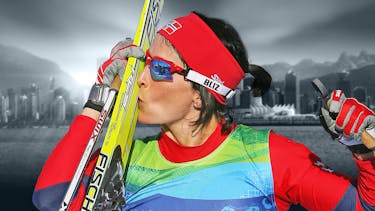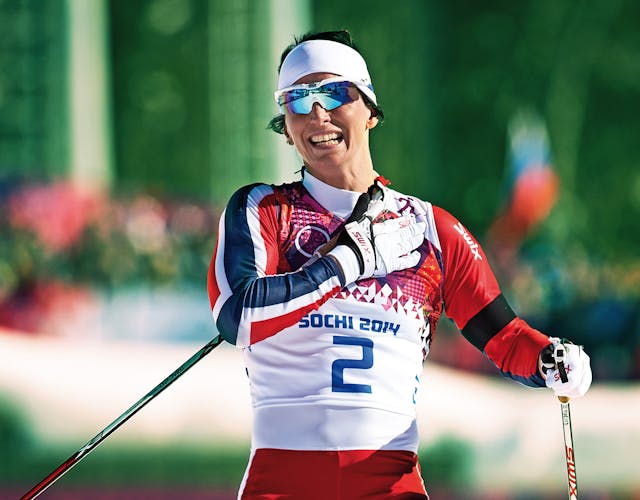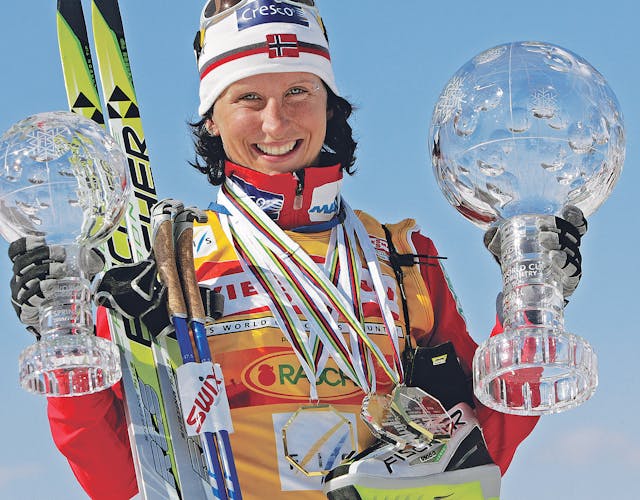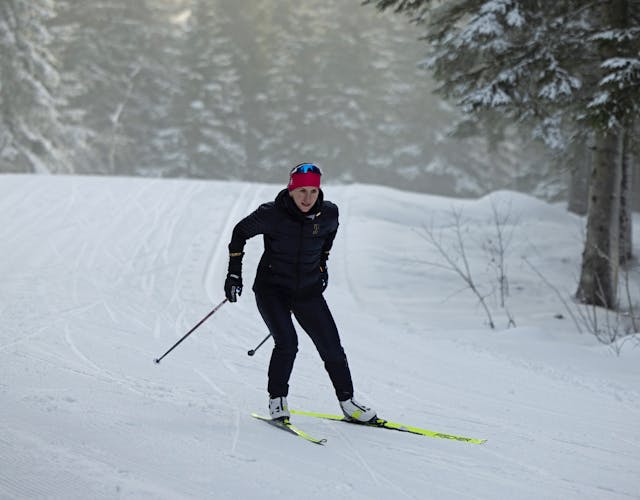Marit Bjørgen, from Trondheim, Norway, is the most successful cross-country skier and Winter Olympian of all time. With 18 world championship titles, 15 Olympic medals - including 8 gold - and 114 World Cup victories, the exceptional athlete has shaped the winter sports scene for years. But the 43-year-old mother of two is also one of the biggest names off the track, passing on her passion for cross-country skiing to the next generation.
When did you start skiing?
I started skiing with my parents. I grew up on a farm with one older brother and a sister who was six years younger. We all liked to be out in the nature. My mother loved skiing also, so she took us out skiing already at the age of two or three years. I always loved skiing and I think I was seven years old when I started to compete.
How was the beginning of your career?
I had a lot of fun with skiing and training when I was young, and I also mastered it very well. I loved skiing and I didn’t think about becoming an Olympic or World Champion. I just wanted to ski and have fun with my friends. When I stepped up to the Junior Team and then the National Team, I understood it's maybe possible to be a good skier.
Do you remember every single medal of your career?
I don’t remember all the medals, but of course I remember my eight gold medals at the Olympics. But it's not the medals which have been the motivation. It was the work with the other women and to be on a high level.
Was there one result which stands out?
There have been so many different races during my career, so it’s hard to pick one which is special. In the beginning, winning the first World Cup in a distance race was very big, then winning the first sprint in Düsseldorf in 2002. Later, the Vancouver Olympics and winning the 30K in PyeongChang at the end of my career was likewise very special.
How important was the team around you?
I think that's the reason I was competing for such a long time - I was 38 when I stopped competing. Of course, it was hard work to be on the highest level but, together with the friends and the team around me, I had a really good time. I can say that this group is my second family. I was very happy to travel around competing and training together with them. When you're training together with other girls who are also at a high level, you can push yourself and become better. My career has definitely been how it was because of the team around me.
How did you deal with the pressure during your skiing career?
It was no problem over the last ten years. But in the beginning, it was more difficult. When you are winning and then not winning a race, there is the question of what went wrong. You think a third place is very good still but for the media it wasn’t good enough. So, I had to work on that a bit and to learn to think differently. It was important to decide by myself if it was a good or a bad race and not let the media decide about it. The older you are the better you learn to take it. However, the biggest pressure comes from yourself. The last ten years of my career I liked it to feel this pressure because that meant that you know that you are good and it's possible to fight for medals.
What do you think about the media?
It is important for the sport that media is there. If they weren’t there, the sport would die. So, it's very important as an athlete to talk to them. I feel that it was a bit different in terms of media when I was starting in the World Cup in 1999/2000. There was just one person from each media outlet. Now there are three or four from the same media outlet. This is where I can see a big difference during my long career. It is not enough to just talk about the results anymore. You have to find new things to talk about, because the results are already old the day after a race.
How was your time in long distance?
It was nice to do long distance. Right after I stopped [racing on the World Cup] in 2018, I thought I was going to train more than I actually did. Then, Jørgen Aukland [team manager of Team Radge Charge] asked me if I would like to start for his team in long distance and I wasn’t sure if I should do it or not. I thought I could train between 10 and 15 hours per week while taking care of my family. But I learned that if you want to fight for podium in long distance, you really have to train more. So, I felt I was not doing the best to be on highest level, and it was so much harder to compete. I didn’t have the time and motivation to train more to be on the top either, therefore I stopped. However, it was a good time, and I was more out skiing than I was the year before.
What did you learn during your skiing career, and what helps you in “normal” life?
I think I learned a lot of things in the career that I could take with me for the life I have now. To work hard to achieve your goals is something that you can use in other areas than training and skiing. Also, to work with the team around you. I think how we worked together on the team during the last ten years of my career was the reason why the Norwegian women have been so successful. This is something that I can take also with me in family life and also for work: Learn from each other because we all have different strengths.
Do you miss something from sports?
Some things you only find in sports. Honestly, I miss the feeling when you are competing and winning. This you can’t find outside sports. Of course, I'm not missing all the hard work you have to do to be on the highest level, but I miss the team around me, the coaches and the whole big family. But I still have a good contact with my friends from when I was in the team. We meet with each other and train together. Like I said, this is my other family.
What would you give as an advice to young skier starting a professional career?
My advice to the young skiers is that they have to do it [for themselves] because it means a lot for them and don’t do it for their parents, the trainer, or others. It’s important that it gives them something back like happiness, because then it is easier to do the hard work you have to do to be on the highest level.
Did you miss something in life because of skiing?
I don't think I missed something. Of course, you have to make the decision. There weren’t that many holidays or going out partying or something. But I think I have been enjoying the life I had because I could do what I liked the most. Skiing and training to be better and focusing on my goals was the life I wanted to have – it was my work, and I am really satisfied with that.
Is there anything you would like to change in your skiing career?
If I could turn back the time, I can’t say that I wanted to change something. I think I had a great career and I really had fun with it. Maybe, during some years, I feel that I could have done different training. I wasn't that good at this time, but I also learned a lot out of this period, and I think that made me be an even better athlete later in my career.
How is skiing for you now?
For me, skiing is being out in nature. I'm just training and going out because I really like it. When I was an athlete, not every training lesson was that great to do. But now I do it because of I really want to get out and enjoy nature, the weather, and the atmosphere around me. When I feel it is enough, I go home. It's nice to have that possibility instead of always training to be on the top. And sometimes I just stay at home and inside because of the weather and there is not enough motivation to go outside.
How does skiing with your kids work?
I like to be out together with my kids skiing. I'm also the trainer for my oldest son. He's seven years old and to see the happiness on the face while he is skiing gives me a lot. It's great to show them what I really like: to be out in the nature and to be happy using my body while skiing. However, as a professional skier, you also want sometimes to go fast. Now I really have to go slower. Therefore, I feel that I also have to train in the morning before I go out with my family so I then can take it at my own speed and just follow my son’s steps later in the day.
How important is it for you that your kids are racing?
It's not important to me that they are racing. For me it is more important that they like to go out and ski. They have to follow their own way and do what they really want to do themselves. However, if they really want to race, I will be there and support them.
How do you spend the weekend with your family?
We like to stay out. This doesn’t have to be skiing, we also enjoy sledding or just playing in the snow. It’s most important that we can be together and be outside, which means a lot for me.
How is the feeling that people know you wherever you go?
I feel it’s nice that people recognize me. When I go out skiing, they stop and they want to thank me for my long career and the inspiration I have given them. They tell me that they miss me in the tracks, and it is nice to hear that they still remember me.







